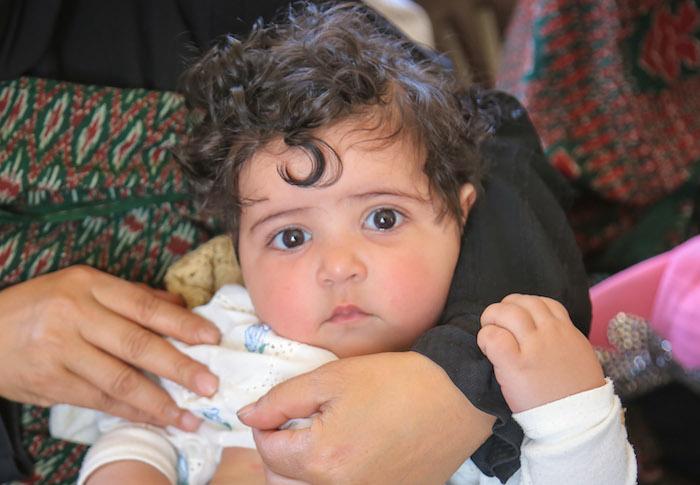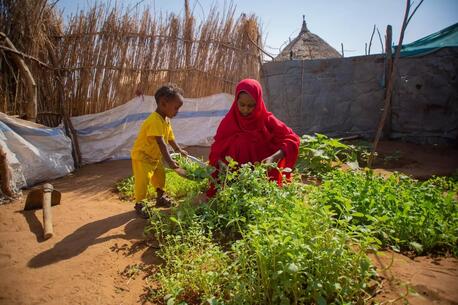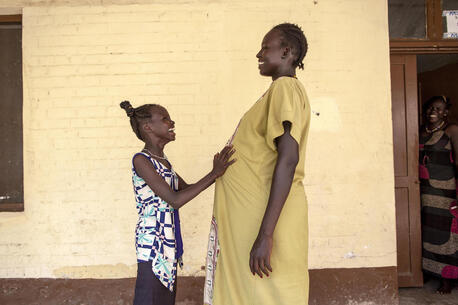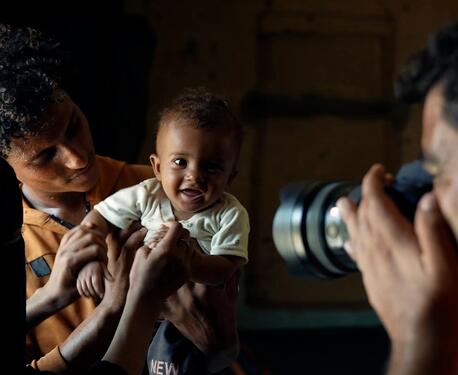Making a Difference in Yemen, One Child at a Time
Despite crippling effects of five years of conflict on the country's health system, community health facilities keep at it, with UNICEF support.
It's been five years since hostilities in Yemen escalated into full-blown war, creating a humanitarian emergency of epic scale. Some 24 million people — 80 percent of the country’s population — are in need of assistance, including more than 12 million children.
Yemen's economy remains in ruins. Families struggle daily to get the food and medicine they need to keep children alive. Disease outbreaks are a constant threat, and over 360,000 children suffer from severe acute malnutrition.

Amira, 10 months old, is getting better after being treated for pneumonia at the UNICEF-supported Al-Hatab Health Center in west-central Yemen. @ UNICEF/2019/Haleem
With the country's health system on the brink of collapse, it has been years since many health workers have received a salary. And yet with UNICEF's support, many keep at it, alongside UNICEF health workers who have stepped in to help fill the void. UNICEF and partners are also providing medical supplies and other support facilities needed to keep delivering services.
With Yemen's health system on the brink of collapse, community health facilities keep going, with UNICEF support
“UNICEF is striving to help strengthen the system, to reach every child with an integrated package of essential health services,” says Dr. Nuzhat Rafique, a UNICEF health manager in Yemen. To expedite that effort, UNICEF-supported health workers go out into the communities to identify those who are sick, malnourished or both, and refer them for facility care. The earlier these kids can be identified and connected with services the better, she says.
UNICEF health manager Dr. Nuzhat Rafique discusses how UNICEF is supporting health facilities in Yemen and health workers still struggling to do their jobs after five years of conflict in the country. © UNICEF/2019/Haleem
"Malnutrition is a very big problem," Dr. Rafique says. Children who are malnourished, she notes, "are at much higher risk of comorbidities such as pneumonia and diarrhea. So we are trying our level best to invest in community health networks and primary health care facilities."
Many families who need to bring their children in for specialized care can't afford transportation, so UNICEF is also providing vouchers to help cover those costs. "More resources are required to scale up these services," Dr. Rafique says.
The big picture: more support is needed to meet a range of urgent needs in Yemen
Supporting health facilities and health workers is just part of UNICEF's ongoing response in Yemen. Teams have been on the ground since the beginning, coordinating with other UN agencies and partners in country to bring relief in every programmatic area, from water, sanitation and hygiene (WASH) to education.
UNICEF reached 2 million people in Yemen with safe drinking water in January 2020 alone, for example. With 2 million kids out of school, UNICEF is working to support teachers and students, providing learning materials and other assistance.
Mothers wait for their children to be seen by health workers at the UNICEF-supported Al-Hatab Health Center. © UNICEF/2019/Haleem
The needs of children and families in Yemen continue to exceed current funding levels, however. More support is needed to help UNICEF maintain key interventions in the country — to continue helping kids cope with the wide-ranging repercussions of the ongoing conflict, to recover from traumas they may have suffered and to get on with their childhoods.
Support ongoing relief efforts in Yemen. Your contribution can help make a difference.
Top photo: Dr. Marwan Alufersi, a pediatrician, does what he can for his young patients at the UNICEF-supported Alhatab Health Center, located in the Hamdan district of Yemen's Sana'a Governorate. After five years of conflict, malnutrition is widespread, and many children require treatment for pneumonia and diarrhea. © UNICEF/2019/Haleem


